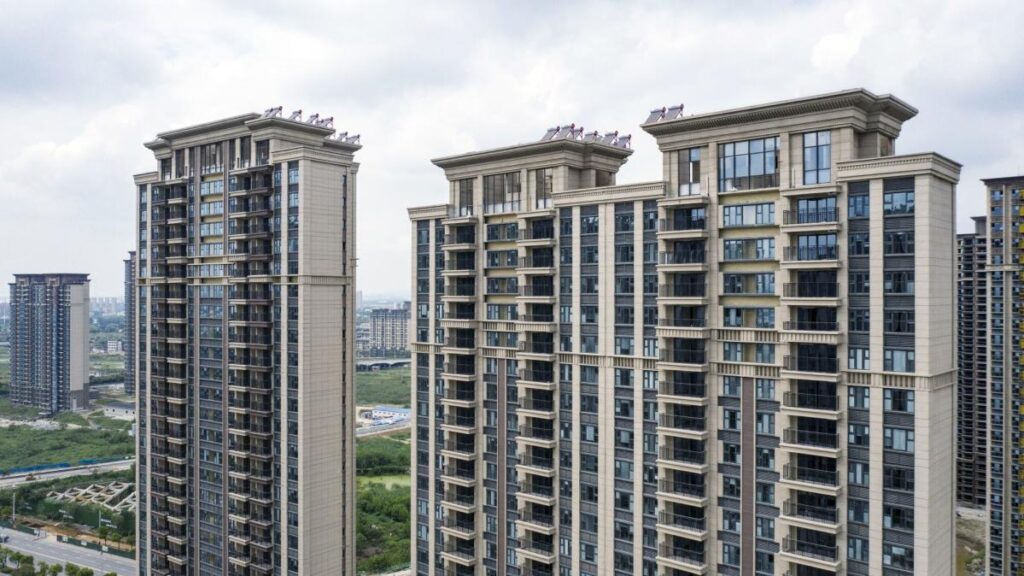(Bloomberg) — China Evergrande Group is running out of time to get what would be one of the nation’s biggest-ever restructurings back on track, after setbacks in recent days that raise the risk of liquidation.
Most Read from Bloomberg
The string of surprise developments include scrapping key creditor meetings at the last minute, saying it must revisit its restructuring plan, detention of money management unit staff and an inability to meet regulator qualifications to issue new bonds.
That last item is a major setback to its planned restructuring of at least $30 billion of offshore debt that would have creditors swap defaulted notes for new securities. Evergrande’s shares plunged as much as 25% Monday.
At the epicenter of China’s property crisis, Evergrande is under pressure to finalize a blueprint for its offshore debt restructuring as it grapples with an even bigger pile of total liabilities that amount to 2.39 trillion yuan ($327 billion)—among the biggest of any property firm in the world. The clock is ticking. The company faces an Oct. 30 hearing at a Hong Kong court on a winding-up petition, which could potentially force it into liquidation.
The distressed real estate giant said late Sunday it couldn’t satisfy requirements of the China Securities Regulatory Commission and the National Development and Reform Commission to issue new notes. It cited an investigation of subsidiary Hengda Real Estate Group Co., without elaborating. The unit said in August that CSRC had built a case against it relating to suspected information disclosure violations.
The latest signs of trouble at Evergrande caused simmering worries about China’s deepening property crisis to flare. A gauge of Chinese property stocks tumbled the most in nine months on Monday, taking its loss in valuation this year to $55 billion. China Aoyuan Group Ltd. slumped by a record after its shares resumed trading, and property investing firm China Oceanwide Holdings Ltd. faced court-ordered liquidation after a Bermuda court issued a winding-up order.
Evergrande, whose default in late 2021 opened the door to record debt failures by developers, late Friday canceled key creditor meetings that had been set for early this week and said it must reassess its proposed restructuring. It cited sales that have “not been as expected.”
“A huge amount of work has gone into the planning and formulation of Evergrande’s restructuring plans, but if the sales forecasts underpinning the turnaround now appear unachievable, it is better to revisit the deal terms before scheme meetings are held,” said Jonathan Leitch, a partner specialized in debt restructuring at law firm Hogan Lovells in Hong Kong.
Creditors could expect a “downward revision” in terms and the repayment periods may be further stretched out, according to Leitch. The delay “creates more uncertainty and will further test the patience of bondholders.”
The developments follow news just about a week ago that authorities detained some staff of Evergrande’s money management business, a sign that its saga has entered a new phase involving the criminal justice system. The setbacks also come as strains mount among other major developers including Country Garden Holdings Co., which shocked China’s financial markets last month by missing initial deadlines to pay dollar bond interest.
The worsening industry crisis has fueled concerns among some global money managers that Chinese assets are becoming ‘uninvestable,’ amid weak governance and disclosure practices. China’s offshore junk bonds, most of which were issued by builders and which were once once of the world’s most lucrative fixed-income trades, have lost more than $127 billion in value since peaking just two and a half years ago.
Evergrande didn’t explain what reassessing debt terms would mean for creditors who have already endorsed the existing restructuring plan, nor did it detail the level of support for its current plan.
The difficulty in issuing new notes for the developer could drastically change the design of the firm’s restructuring, and what creditors’ recovery may look like. In an early proposal published in March, Evergrande provided an option for creditors to receive new notes maturing in 10 to 12 years. Or, they could choose a combination of equity-linked securities.
But now after the latest news, converting all debt to shares of Evergrande or of its arms remains “the only option for debt restructuring,” wrote UOB Kay Hian analysts including Liu Jieqi in a note. Even this solution “faces great uncertainties,” they said.
When Evergrande updated the market on progress on its restructuring plan in April, investors identified as “Class C” creditors with about $15 billion of claims emerged as a group that hadn’t given sufficient support. Those holding more than 30% of Class C debt had endorsed the restructruring proposal, far below the 75% needed from each creditor class to implement it through what’s known as a scheme of arrangement.
Another group under China Evergrande Group’s scheme, known as Class A creditors, and accounting for $17 billion of claims, already delivered a support level of over 77% as of the April filing.
Evergrande didn’t provide a new schedule for the meetings, only saying it would make further announcements when there is an update.
Several Chinese developers are contending with similar winding-up lawsuits from foreign stakeholders frustrated by what they see as the slow pace of restructuring talks. Such petitions can potentially force a court-ordered liquidation.
Evergrande had previously postponed creditor meetings that were scheduled to begin Aug. 28. At that time it had cited a desire to let creditors “consider, understand and evaluate” the terms of the schemes and give them more time to consider recent developments, including a share trading resumption.
Earlier this month the company also revised dates of the scheme sanction hearings to October.
–With assistance from John Cheng.
(Adds analysis and updates throughout)
Most Read from Bloomberg Businessweek
©2023 Bloomberg L.P.


